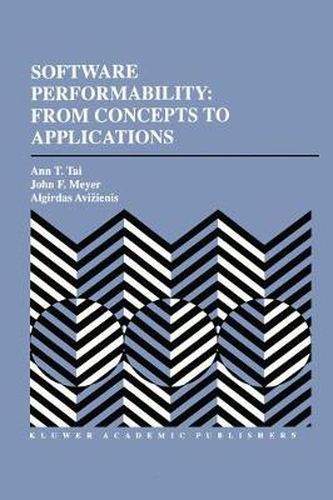Readings Newsletter
Become a Readings Member to make your shopping experience even easier.
Sign in or sign up for free!
You’re not far away from qualifying for FREE standard shipping within Australia
You’ve qualified for FREE standard shipping within Australia
The cart is loading…






This title is printed to order. This book may have been self-published. If so, we cannot guarantee the quality of the content. In the main most books will have gone through the editing process however some may not. We therefore suggest that you be aware of this before ordering this book. If in doubt check either the author or publisher’s details as we are unable to accept any returns unless they are faulty. Please contact us if you have any questions.
Computers are currently used in a variety of critical applications, including systems for nuclear reactor control, flight control (both aircraft and spacecraft), and air traffic control. Moreover, experience has shown that the dependability of such systems is particularly sensitive to that of its software components, both the system software of the embedded computers and the application software they support. In this volume, the construction and solution of analytic performability models for critical-application software are addressed. The book includes a review of general performability concepts along with notions which are peculiar to software performability. Since fault tolerance is widely recognized as a viable means for improving the dependability of computer system (beyond what can be achieved by fault prevention), the examples considered are fault-tolerant software systems that incorporate particular methods of design diversity and fault recovery. This work should be of benefit to both practitioners and researchers in the area of performance and dependability evaluation, fault-tolerant computing, and dependable systems for critical applications. For practitioners, it supplies a basis for defining combined performance-dependability criteria (in the form of objective functions) that can be used to enhance the performability (performance/dependability) of existing software designs. For those with research interests in model-based evaluation, the book provides an analytic framework and a variety of performability modelling examples in an application context of recognized importance. The material contained in this book should also both stimulate future research on related topics and, for teaching purposes, serve as a reference text in courses on computer system evaluation, fault-tolerant computing, and dependable high-performance computer systems.
$9.00 standard shipping within Australia
FREE standard shipping within Australia for orders over $100.00
Express & International shipping calculated at checkout
This title is printed to order. This book may have been self-published. If so, we cannot guarantee the quality of the content. In the main most books will have gone through the editing process however some may not. We therefore suggest that you be aware of this before ordering this book. If in doubt check either the author or publisher’s details as we are unable to accept any returns unless they are faulty. Please contact us if you have any questions.
Computers are currently used in a variety of critical applications, including systems for nuclear reactor control, flight control (both aircraft and spacecraft), and air traffic control. Moreover, experience has shown that the dependability of such systems is particularly sensitive to that of its software components, both the system software of the embedded computers and the application software they support. In this volume, the construction and solution of analytic performability models for critical-application software are addressed. The book includes a review of general performability concepts along with notions which are peculiar to software performability. Since fault tolerance is widely recognized as a viable means for improving the dependability of computer system (beyond what can be achieved by fault prevention), the examples considered are fault-tolerant software systems that incorporate particular methods of design diversity and fault recovery. This work should be of benefit to both practitioners and researchers in the area of performance and dependability evaluation, fault-tolerant computing, and dependable systems for critical applications. For practitioners, it supplies a basis for defining combined performance-dependability criteria (in the form of objective functions) that can be used to enhance the performability (performance/dependability) of existing software designs. For those with research interests in model-based evaluation, the book provides an analytic framework and a variety of performability modelling examples in an application context of recognized importance. The material contained in this book should also both stimulate future research on related topics and, for teaching purposes, serve as a reference text in courses on computer system evaluation, fault-tolerant computing, and dependable high-performance computer systems.